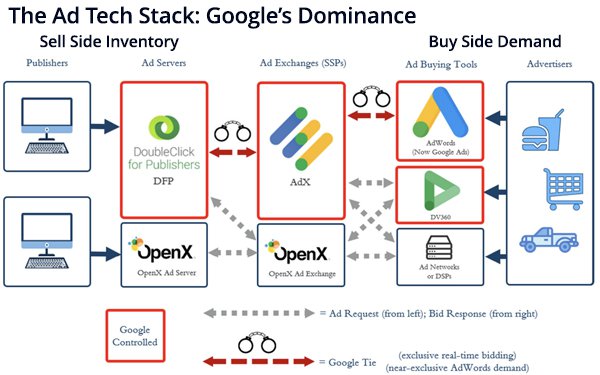
OpenX filed a suit against Google alleging
anticompetitive practices that manipulated auctions, destroyed its ad server business, and hurt its ad exchange.
“This lawsuit seeks not only to recover the damages caused to our
company, but also to ensure fair competition moving forward,” the company wrote in the lawsuit.
OpenX’s business model has undergone significant changes in nearly a decade. The
company claimed it had been driven out of the market by Google's anticompetitive practices, forcing OpenX to shut down its ad server product in 2019 to focus on programmatic advertising and video.
The lawsuit describes a “three pillar” strategy Google implemented after acquiring DoubleClick in 2008. It includes access to premium publisher inventory on the use of Google’s ad
server (DFP), funneling inventory through its own ad exchange (AdX), and requiring advertisers using Google’s network to buy inventory solely through AdX.
advertisement
advertisement
The lawsuit, in fact, repeats
many of the Department of Justice (DOJ) claims against Google that were part of the antitrust lawsuit Google lost. One of the more shocking is that Google could enter a bid after seeing all from rival
supply side platforms (SSPs).
It accused Google of manipulating digital advertising auctions so other ad exchanges won fewer transactions through programs that allowed Google’s ad
exchange to see competing exchanges’ bids before bidding, and then adjusted its net bids in response.
This is how it worked. Publishers were locked into using Google’s ad server
and ad exchange, altering the waterfall process for publishers using Google DoubleVerify for Publishers (DFP) by requiring publishers to prefer AdX over all other demand sources.
The lawsuit
explains that “Google transformed the publisher-controlled waterfall, in which each bidder had acted independently, into a sequence in which AdX, and AdX alone, learned its competitors’
predicted bids and was then given the opportunity to bid first—a First Look at inventory.”
The suit explains that this rigged the waterfall and allowed AdX to outbid any potential
rival demand sources before they even had an opportunity to participate. Google’s First Look allowed AdX to pick the most valuable ad requests, which rival exchanges would never even see because
Google could bid—and win—before those ad requests ever were offered to other ad exchanges.
OpenX is suing Google for damages, suggesting without the anticompetitive practices it
would have remained on a much more lucrative path.
The company also said Google prevented publishers from setting price floors that would drive more transactions into non-Google ad exchanges,
even when the publishers wanted to, impacting the OpenX Ad Exchange.
The suit aims to recover monetary damages caused to its business from Google’s anticompetitive conduct, and wants a
judgment that would prevent the conduct from continuing.
The damages being sought under federal antitrust law go along with injunctive relief to stop ongoing anticompetitive conduct and
restore competition in the ad tech market. The complaint requests compensation for “compensatory, consequential and punitive damages” in addition to “costs of suit, including
attorneys’ fees.”